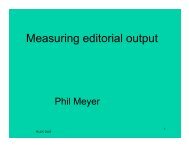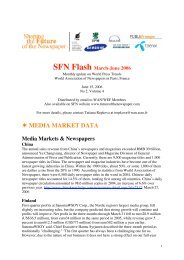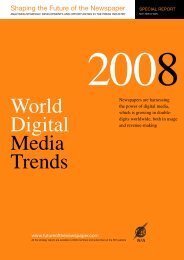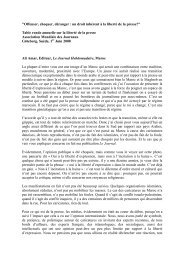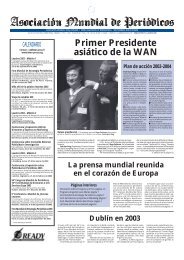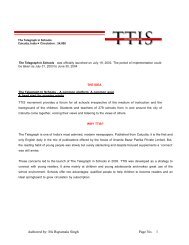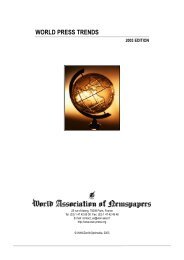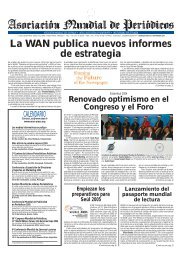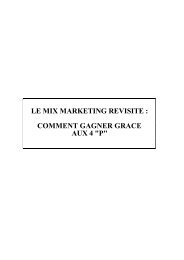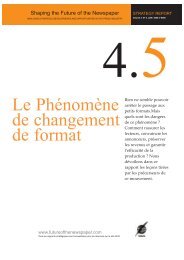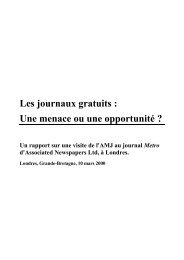Shaping the Future of the Newspaper - World Association of ...
Shaping the Future of the Newspaper - World Association of ...
Shaping the Future of the Newspaper - World Association of ...
You also want an ePaper? Increase the reach of your titles
YUMPU automatically turns print PDFs into web optimized ePapers that Google loves.
JUNE 2005 SHAPING THE FUTURE OF THE NEWSPAPER<br />
Procter & Gambles <strong>of</strong> this world that called<br />
<strong>the</strong> shots over <strong>the</strong> supermarkets because <strong>the</strong>y<br />
were <strong>the</strong> brands <strong>the</strong> supermarkets wanted.<br />
Because <strong>the</strong> supermarkets have got much<br />
bigger, <strong>the</strong> balance <strong>of</strong> power has shifted to<br />
<strong>the</strong>ir side.”<br />
<strong>Newspaper</strong>s in <strong>the</strong> United Kingdom, which<br />
have dramatically increased <strong>the</strong> number <strong>of</strong><br />
copies <strong>the</strong>y sell at <strong>the</strong> checkout in <strong>the</strong> past<br />
decade, have not yet reported problems<br />
dealing with <strong>the</strong> supermarkets. Not <strong>the</strong> case<br />
for magazines. In <strong>the</strong> United States, Wal-<br />
Mart “told Cosmopolitan to remove cover<br />
billings about abortion. It has delisted <strong>the</strong> lad<br />
mags Maxim, FHM and Stuff, and banned an<br />
album by Sheryl Crow, which criticised Wal-<br />
Mart for selling guns”, according to left-wing<br />
columnist George Monbiot.<br />
Monbiot asks whe<strong>the</strong>r <strong>the</strong> tough stance<br />
retailers take with <strong>the</strong>ir suppliers “will come<br />
to govern <strong>the</strong> superstores’ relationships<br />
with newspapers and magazines. If you<br />
doubt this, try to picture a newspaper being<br />
sold beside <strong>the</strong> Tesco checkout with <strong>the</strong><br />
headline ‘Tesco’s bullying tactics exposed’.”<br />
(Although it should be pointed out that<br />
Monbiot was writing in The Guardian, whose<br />
chief executive had recently joined <strong>the</strong> Tesco<br />
board <strong>of</strong> directors to no apparent effect on <strong>the</strong><br />
newspaper’s editorial freedom.)<br />
Monbiot’s main grievance was about <strong>the</strong><br />
possibility <strong>of</strong> a change in wholesale supply<br />
<strong>of</strong> magazines (which ride on <strong>the</strong> back <strong>of</strong><br />
newspapers) that would allow supermarkets<br />
<strong>the</strong> chance to handle distribution – and likely<br />
reduce <strong>the</strong> number <strong>of</strong> titles on <strong>of</strong>fer.<br />
“While <strong>the</strong> supermarkets’ control <strong>of</strong> <strong>the</strong><br />
meat or bread or fruit market is bad enough,<br />
<strong>the</strong>ir control <strong>of</strong> newspapers and magazines<br />
gnaws at <strong>the</strong> ankles <strong>of</strong> democracy,” Monbiot<br />
concludes.<br />
Lynda Dyson, in her essay, reports on<br />
Tesco’s very successful efforts to run <strong>the</strong><br />
news agenda. It’s a reminder to newspapers<br />
that editorial quality and investment must be<br />
maintained if newspapers are not to become<br />
simply purveyors <strong>of</strong> public relations material.<br />
Never<strong>the</strong>less, <strong>the</strong> success <strong>of</strong> supermarket<br />
magazines has made at least one senior<br />
newspaper executive wonder if supermarkets<br />
will want <strong>the</strong>ir own branded newspapers in<br />
future.<br />
Touching on <strong>the</strong> same <strong>the</strong>me <strong>of</strong> media<br />
fragmentation as Caroline Foster Kenny,<br />
Sonia Le Louarn <strong>of</strong> Vodafone discusses<br />
<strong>the</strong> opportunities provided by ad funded<br />
content. The 30-second spot is dead, she says,<br />
describing how Vodafone tied up with MTV,<br />
a crucial marketing marriage between music<br />
and a global brand.<br />
We hope <strong>the</strong>se lessons from o<strong>the</strong>r industries<br />
will encourage newspapers to consider how<br />
<strong>the</strong>y can operate in this increasingly complex<br />
media scrum.<br />
Take Sir Martin Sorrell, <strong>of</strong> <strong>the</strong> WPP Group<br />
<strong>of</strong> advertising and marketing companies who<br />
rejects <strong>the</strong> threat <strong>of</strong> personal video recorders<br />
that will skip <strong>the</strong> ads. “I think <strong>the</strong>y are good<br />
news because <strong>the</strong>y will force advertising<br />
agencies to think about new and more<br />
creative ways <strong>of</strong> reaching <strong>the</strong> consumer . . . It<br />
makes media planning more valuable to <strong>the</strong>ir<br />
clients,” Sir Martin told The Guardian.<br />
He can also <strong>of</strong>fer a piece <strong>of</strong> advice for those<br />
perplexed by this changing media world.<br />
“There are only two ways that companies win<br />
in our current environment <strong>of</strong> low inflation<br />
and little pricing power, with concentrated<br />
distribution in powerful outlets such as Wal-<br />
Mart, Tesco and Carrefour,” Sir Martin said.<br />
“One is through innovation, investing in new<br />
product development. The o<strong>the</strong>r, once you<br />
have new innovations in place, is investing<br />
in branding and <strong>the</strong> differentiation behind<br />
<strong>the</strong>m.”<br />
6




